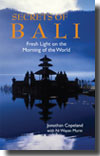| Our Publications | ||
| Books by Title | ||
| Books by Author | ||
| Books by Country | ||
| E-books | ||
| About | ||
| Orchid Press E-books | ||
| Distributed E-books | ||
| Our Bookshop | ||
| About Us | ||
| Browse Shop | ||
| How to Buy | ||
| Contact Us | ||
| WE BUY BOOKS AND LIBRARIES | ||
|
||
Book Reviews

Secrets of Bali:
New Light on the Morning of the World
by Jonathan Copeland with Ni Wayan Murni
2010, 312 pp., 110 line drawings, 1 map, glossary, bibliography, index, 21.5 x 14 cm., softcover.
ISBN-13: 978-974-524-118-3 $30.00
(E-book edition $11.99)
An account of Bali’s past and present
Book review by Rob Goodfellow
(Jakarta Post, 5 September 2010)
Bali is one of the world’s best-known “tourist brands”. It is not just an island, but a phenomenon. Ironically, until recent times, most Americans, Europeans, Japanese and Australians knew something about Bali, but were not sure where Indonesia was.
Yet, increasingly, Bali is the prism through which the world sees and judges Indonesia, one of the most important countries on Earth.
As far as the pervasive global media industry is concerned, if all is well in Bali, then all must be well in Indonesia. The world-wide media coverage of the 2002 and 2005 Bali bombings is evidence of what happens when this tranquility is disturbed. Suddenly, Indonesian home-grown terrorism was thrust onto the world’s conceptual radar screen, where it has remained ever since.
This perspective has come into sharper focus as “the West” has become increasingly concerned with the advent of a pan-Southeast Asian Islamist movement—one that combines a collective base of 200 million Indonesian Muslims, mistreated Muslims in southern Thailand, internationally organized Malaysian Muslims, the wealthy Muslims of Brunei and the Muslim guerrilla fighters in the southern Philippines.
On the outer rim of this potential ideological “ring of fire” is the extraordinary outpost of Hindu culture and religion known as the Island of Bali.
Indian prime minister Jawaharlal Nehru once poetically called Bali “the morning of the world”. The island gives us a glimpse of what Indonesia might have become had the Java-based Islamic Kingdom of Mataram not defeated the Hindu kingdom of Majapahit over five hundred years ago, irrevocably changing the character of the then “East Indies”, and in turn, modern Indonesia.
For this reason Bali is sometimes referred to as a “living museum of Hindu-Buddhist Java”. However, for many visitors the fascination with Bali is not about the past at all, but it is about the right now—today. Bali can teach us many lessons. One lesson is about the values of an ancient culture that has stood the test of time despite the forces of globalization and cultural homogenization.
Above all, Bali represents the hope that human diversity can survive the 21st Century. For reasons not completely understood by anthropologists, Balinese culture remains vibrant, complex and colorful, both in spite of mass tourism and because of it.
Bali has not withered into a pale brochure-like parody of itself because of the onslaught of mass tourism, but instead has thrived and prospered by continually reinventing itself in parallel with, and not in isolation from, other influences.
Human cultures are never static; they are always changing. They may be in decline like some tribal cultures in Africa, the Indian sub-continent, China, Russia and Australia, or they may be in ascendancy, like the American consumer “Coca Cola culture”, none of which ever stand still.
Bali is changing, but in ways that often surprise and delight.
In Secrets of Bali, Jonathan Copeland and Ni Wayan Murni present a wonderfully fast moving account of Bali from the outside in and from the inside out. Secrets of Bali places Bali into the warp and weft of a rich historical tapestry of ever changing contemporary life.
The book explains, clarifies and reveals. It generously offers us a feast of rare and passionate insights from a man who has so obviously fallen in love with Bali, and from a woman, who in so many ways, is Bali.
[Read another review from the Bali Advertiser] [Read a review from ASEASUK News] [Read a review from Tropical Life Magazine] [Read a review from Hello Bali Magazine ] [Read a review from The South China Morning Post] [Read a review from Bali & Beyond] [Read another review from The Bali Advertiser] [Read a review from The Bali Times] [Read about the remarkable life of co-author Murni] [More Orchid Press Reviews]
PO Box 70, Trinity TB, NL, A0C 2S0, Canada
Telephone: +1 709-330-4703